#MoveTheDate
0.9
Days
Slowing the speed of international cargo ships would move Earth Overshoot Day by 0.9 days.
What is the solution?
Slowing down the average speed of international cargo ships.
This solution improves our resource security in the energy category.
How does it #MoveTheDate?
Traveling at slower speeds leads to a reduction in fuel consumption and emissions.
How is it scalable?
Higher fuel costs and/or lower demand for shipping services can result in speed reductions. Average ship speeds can be regulated either globally as a condition of entry for a port or coastal waters, or via bilateral agreements between ports in two or more countries.
What is the solution?
Slowing down the average speed of international cargo ships.
This solution improves our resource security in the energy category.
How does it #MoveTheDate?
Traveling at slower speeds leads to a reduction in fuel consumption and emissions.
How is it scalable?
Higher fuel costs and/or lower demand for shipping services can result in speed reductions. Average ship speeds can be regulated either globally as a condition of entry for a port or coastal waters, or via bilateral agreements between ports in two or more countries.
Generally the principles of physics tell us that slower travel is far more efficient. When it comes to cargo ships, traveling more slowly leads to a reduction in fuel consumption and emissions. The effect is exponential: a 10% reduction in speed results in a 27% reduction in power needs. However this is partially compensated by the fact that it takes longer to sail a given distance. Still, a 20% reduction in speed results in a 24% reduction in emissions.
There are a variety of additional factors to consider when lowering ship speeds: The global fleet may need to be slightly expanded, though a significant portion can be made up of ships currently sitting idle due to low demand. Existing ships will significantly reduce their fuel consumption, however, current engines are still not optimized for slower speeds. In the future, new engines designed for slower speeds would allow for even greater fuel efficiency.
More information on decarbonizing maritime transport can be found here.
There’s no benefit in waiting!
Acting now puts you at a strategic advantage in a world increasingly defined by ecological overshoot. Countless solutions exist that #MoveTheDate. They’re creative, economically viable, and ready to deploy at scale. With them, we can make ourselves more resilient and #MoveTheDate of Earth Overshoot Day. If we move the date 6 days each year, humanity can be out of overshoot before 2050.

